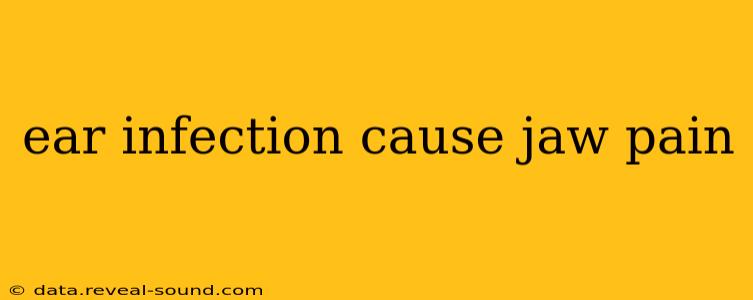Ear infections, particularly those affecting the middle ear (otitis media), can sometimes cause jaw pain. While not always directly linked, the proximity of the ear to the jaw and the intricate network of nerves and muscles in the head and neck region explain this connection. This article will explore the reasons why an ear infection might lead to jaw pain, addressing common questions and offering clarity on this often-misunderstood symptom.
Can an Ear Infection Cause Jaw Pain?
Yes, an ear infection can indeed cause jaw pain. This isn't always the case, but it's a relatively common occurrence, especially with more severe infections. The pain isn't caused by the infection directly spreading to the jaw, but rather through the interplay of several factors:
-
Referred Pain: The most common reason is referred pain. Nerves in the head and neck area are interconnected. When the nerves associated with the ear are irritated by infection and inflammation, the brain may misinterpret the pain signal as originating from the jaw. This is because the same nerves that innervate the ear also serve areas around the jaw.
-
Inflammation and Swelling: Significant inflammation and swelling within the middle ear can put pressure on surrounding structures. This pressure can radiate outward, potentially affecting the temporomandibular joint (TMJ), the hinge connecting your jaw to your skull. This pressure can manifest as jaw pain or discomfort.
-
Muscle Tension: The pain from an ear infection can lead to involuntary muscle tension in the jaw and neck. This tension, often a reflexive response to pain, can cause stiffness and soreness in the jaw muscles.
What are the Symptoms of an Ear Infection That Causes Jaw Pain?
Recognizing the symptoms is crucial for seeking appropriate medical attention. Typical ear infection symptoms include:
- Earache: A sharp, throbbing pain in the ear is the hallmark sign.
- Feeling of Fullness: A sensation of pressure or fullness in the ear.
- Hearing Loss: Temporary hearing loss or muffled sounds.
- Fever: Especially in children.
- Drainage: Pus or fluid draining from the ear.
- Irritability/Restlessness: Common in infants and young children.
The jaw pain associated with an ear infection may be:
- Aching: A dull, persistent ache in the jaw.
- Sharp Pain: Sudden, intense pain, particularly when chewing or opening the mouth wide.
- Stiffness: Difficulty opening or closing the mouth.
- Tenderness to the Touch: Pain when touching the jaw area.
How Long Does Jaw Pain from an Ear Infection Last?
The duration of jaw pain related to an ear infection depends on the severity of the infection and the effectiveness of treatment. With appropriate medical intervention (antibiotics if bacterial), the infection and associated jaw pain typically resolve within a few days to a couple of weeks. However, if the pain persists or worsens, it's essential to consult a doctor to rule out other potential causes.
Does Jaw Pain Always Mean an Ear Infection?
No, jaw pain is not always a sign of an ear infection. Numerous other conditions can cause jaw pain, including TMJ disorders, dental problems, sinus infections, and neuralgia. It's crucial to seek professional medical advice to determine the underlying cause of your jaw pain.
What Should I Do if I Have Jaw Pain from an Ear Infection?
If you suspect you have an ear infection causing jaw pain, you should consult a doctor or other healthcare professional. They can properly diagnose the infection, rule out other potential causes, and recommend the appropriate treatment. Treatment may involve antibiotics (for bacterial infections), pain relievers, and ear drops. Applying a warm compress to the affected ear might provide temporary relief from pain and discomfort.
When Should I See a Doctor for Jaw Pain?
Seek immediate medical attention if:
- Your jaw pain is severe or debilitating.
- You have a high fever (above 101°F or 38.3°C).
- You have difficulty opening your mouth.
- You experience any hearing loss or drainage from the ear.
- Symptoms don't improve after a few days of home treatment.
By understanding the possible connection between ear infections and jaw pain, you can better assess your symptoms and seek timely medical care for appropriate diagnosis and treatment. Remember, self-treating can be risky; always consult a healthcare professional for any persistent pain or concerning symptoms.
